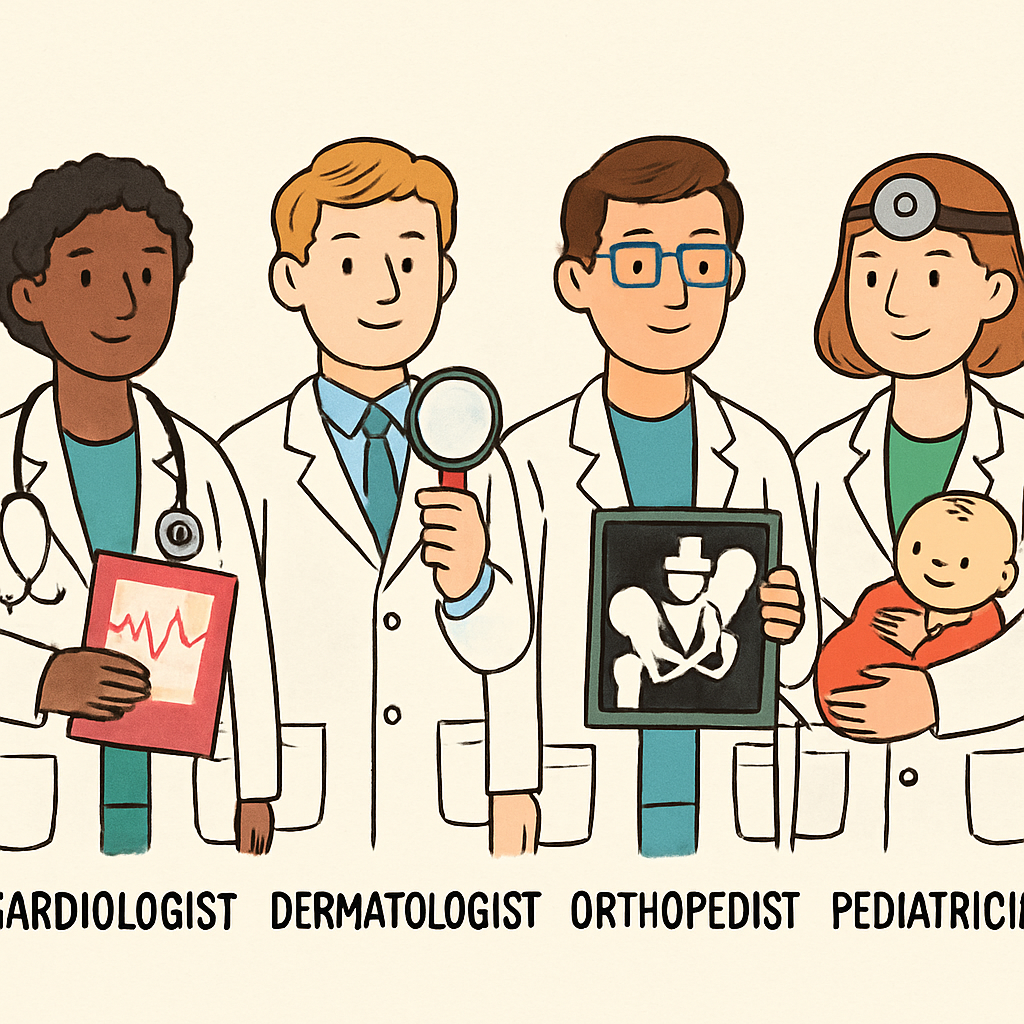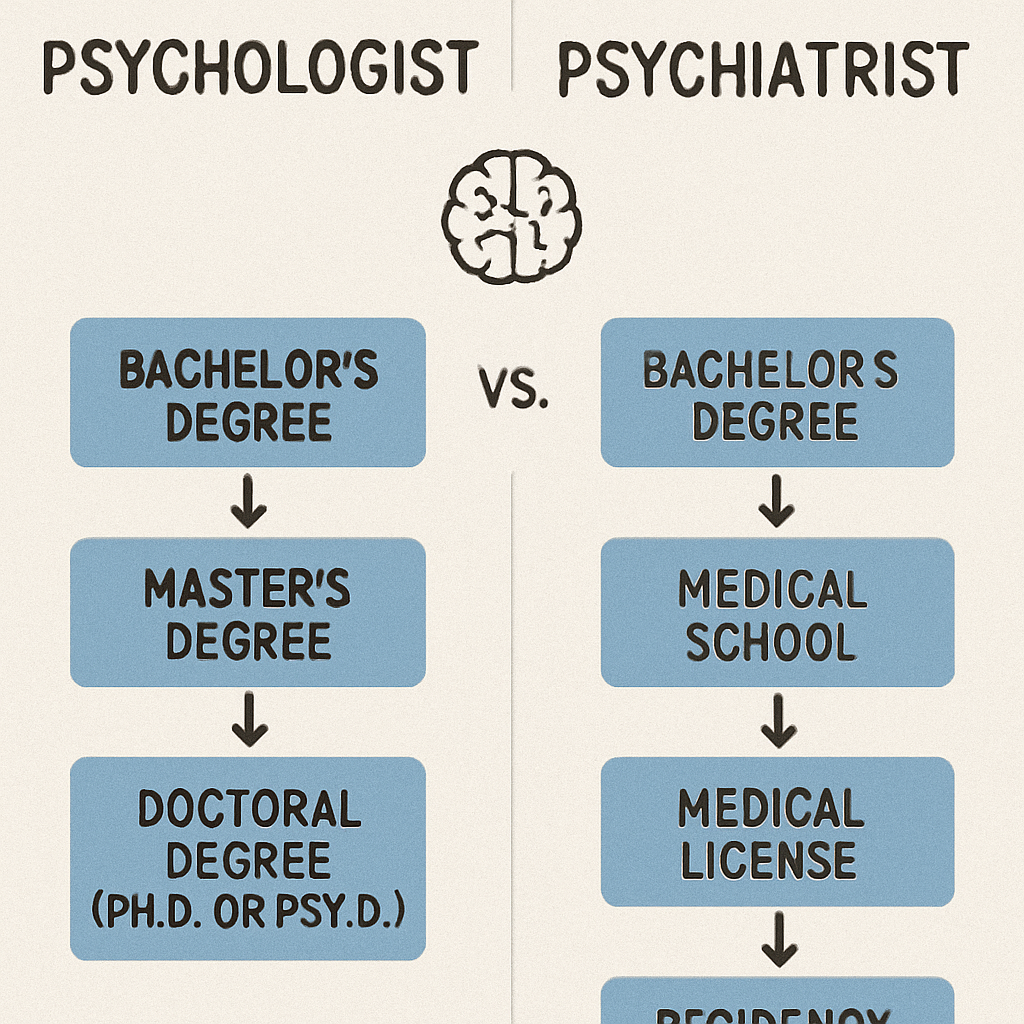July 20, 2025
Are psychologists doctors? Learn about psychologists' roles, their capabilities, and the differences between psychologists and psychiatrists, including prescription rights.
Understanding the role of psychologists in the medical field can be confusing. Many people wonder if psychologists are considered doctors. This question often arises when seeking mental health care.
Psychologists hold advanced degrees in psychology. They typically earn a Ph.D. or Psy.D. This education qualifies them as doctors in their field. However, they are not medical doctors (MDs).
The distinction between psychologists and psychiatrists is important. Psychiatrists are medical doctors who specialize in mental health. They can prescribe medication, unlike most psychologists.
Psychologists focus on diagnosing and treating mental health disorders. They use therapy and counseling as their primary tools. Their role is crucial in mental health care.
The ability to prescribe medication varies by state. Some states allow psychologists with additional training to prescribe. This is not common across the United States.
Understanding these differences helps in choosing the right mental health professional. It ensures that individuals receive appropriate care. This article will explore these roles and clarify common misconceptions.
The term "doctor" can lead to confusion. Not all doctors are medical doctors. The title can refer to different kinds of expertise.
Traditionally, a doctor is thought to be someone who practices medicine. Yet, individuals with a doctoral degree in any field are also called doctors. This includes fields such as education, psychology, and law.
In psychology, professionals with a doctorate degree hold significant expertise. They are considered doctors in their area of study. However, their role differs from that of a medical doctor.
Understanding the use of the term "doctor" requires context. Here are key points:
These distinctions help in understanding professional roles in healthcare.

Knowing who can do what is essential in seeking treatment. The goal is to find a professional who meets your mental health needs. This clarity ensures effective and appropriate treatment.
The paths to becoming a psychologist or psychiatrist are quite distinct. Both require rigorous training, but the focus diverges.
Psychologists typically earn a Ph.D. or Psy.D. in psychology. This involves several years of study, research, and clinical internships. Their training emphasizes understanding behavior, emotion, and thought processes.
Psychiatrists, on the other hand, attend medical school. They obtain an MD or DO degree, followed by a residency in psychiatry. Their education combines medical training with a focus on mental health.
The educational journey for each is extensive, ensuring depth of knowledge. Here is a breakdown of their training paths:
While both provide mental health care, their approaches are different. Psychologists often use therapeutic techniques. Psychiatrists are adept at integrating medical and therapeutic methods.
Each profession plays a crucial role in mental health. Recognizing these differences aids in choosing the right type of care.

Ultimately, both paths aim to improve mental health outcomes. They do so through complementary, yet distinct, methodologies.
The term "doctor" carries different meanings. In the medical field, it often refers to physicians holding an MD. However, psychologists hold doctoral degrees, such as a Ph.D. or Psy.D., which also grants them the title of "doctor."
Psychologists are not medical doctors. They do not attend medical school or complete medical residencies. Instead, their focus lies in understanding and treating mental and behavioral issues through non-medical means.
The doctoral training for psychologists emphasizes research, theory, and therapy. Despite not being physicians, psychologists' education is extensive and specialized. This qualifies them to assess and address mental health concerns effectively.
It's important to understand this distinction. While psychologists use the "doctor" title, they don't prescribe medication in most states. This role typically belongs to psychiatrists, who are medical doctors.
The recognition of psychologists as "doctors" acknowledges their expertise and depth of knowledge. It underscores their vital role in mental health care. Understanding this context helps individuals make informed choices about their mental health needs.
Prescribing medication is a common point of confusion regarding psychologists' roles. Generally, psychologists do not prescribe medication. Their training focuses on therapeutic techniques, research, and psychological assessment.
However, there are exceptions. In a few states, psychologists with specialized training can prescribe medications. These states include New Mexico, Louisiana, and Illinois. In these cases, psychologists must complete additional coursework in psychopharmacology.
Most often, prescribing is left to psychiatrists and other medical professionals. Psychiatrists hold medical degrees and have the authority to prescribe drugs. This distinction is crucial when considering different treatment options for mental health issues.
The professional landscape is evolving, with some advocating for more psychologists to gain prescriptive rights. The goal is to increase access to comprehensive care, especially in underserved areas. The debate centers on patient safety and the adequate training required for prescribing.
Here's a summary of key points regarding prescription capabilities:
Understanding who can prescribe medication helps in choosing the right care provider. Considering both therapy and medication options may provide a balanced approach to mental wellness.

by Vitaly Gariev (https://unsplash.com/@silverkblack)
The roles of psychotherapists, therapists, and counselors often create confusion about who can prescribe medication. Let's clear up these distinctions.
Generally, none of these professionals prescribe medication. Their primary focus is on providing therapy and emotional support. They help clients navigate mental health challenges through conversation and guidance.
The ability to prescribe medication typically lies with psychiatrists and other medical doctors. These professionals can legally prescribe due to their medical training and expertise.
Some misconceptions exist about the prescriptive authority of psychotherapists. Though some psychotherapists hold doctoral degrees, prescribing is not part of their role. Instead, they often collaborate with prescribing professionals for comprehensive care.
Here's a breakdown of who can and cannot prescribe medication among mental health professionals:
Understanding these distinctions helps in making informed decisions about seeking mental health treatment. It ensures patients receive the appropriate combination of therapy and medical interventions.

by Edi Kurniawan (https://unsplash.com/@edikurniawan)
The term "psychotherapist" can be misleading regarding medical qualifications. Not all psychotherapists hold a medical degree (MD).
Psychotherapists come from diverse educational backgrounds. They can be psychologists, social workers, or counselors. These professionals have varied training, but typically hold advanced degrees in their specific fields.
Unlike psychiatrists, who are medical doctors, most psychotherapists lack the authority to prescribe medication. Their expertise lies in talk therapy and mental health support. Their work focuses on helping clients understand their feelings and behaviors.
In some cases, advanced training allows certain psychologists to gain limited prescriptive rights in a few states. However, this is an exception rather than the norm. So, while psychotherapists play a crucial role in mental health care, their focus remains on therapy rather than medication management. Understanding this distinction helps individuals choose the right professional for their mental health needs.
Psychologists play a vital role in diagnosing and treating mental health disorders. Their work primarily involves therapeutic techniques rather than medication.
Through years of education and training, psychologists gain profound insights into human behavior. They employ methods like cognitive-behavioral therapy to help patients cope with mental health challenges.
Psychologists often conduct psychological assessments. These assessments help diagnose conditions like anxiety, depression, and personality disorders. Their expertise is crucial in devising effective treatment plans.
Psychologists work in various settings, offering therapy in private practices, schools, and hospitals. Some contribute to academic research, advancing our understanding of mental processes.
While psychologists generally do not prescribe medication, their collaboration with psychiatrists can be vital. This teamwork ensures holistic care for patients.
Key components of their role include:

by Jon Tyson (https://unsplash.com/@jontyson)
The demand for psychologists is on the rise, emphasizing their importance in mental health care. Understanding their role can guide individuals in choosing appropriate mental health support.
Collaboration is critical in mental health care. Psychologists often work alongside psychiatrists and other specialists. This teamwork enhances patient outcomes by providing comprehensive treatment.
Psychiatrists are medical doctors who can prescribe medication. They offer a different skill set compared to psychologists. Together, they ensure a balanced approach to mental health issues.
Effective collaboration involves understanding each professional's expertise. Psychologists focus on therapy and behavioral strategies. In contrast, psychiatrists manage medication needs. This division ensures patients receive holistic care.
Other professionals, such as social workers and counselors, also play roles. Their responsibilities might include support groups or community-based services. When mental health professionals collaborate, they create a robust network of care.
Key aspects of this collaboration include:
In essence, this collaborative approach enriches mental health care. It integrates diverse expertise, benefiting patients seeking comprehensive support.
Choosing the right mental health professional is crucial for your wellness journey. Consider your specific needs and goals before making a decision. Different professionals offer varied expertise and approaches.
Start by understanding the types of professionals available. Psychologists focus on cognitive therapies and assessments. Psychiatrists manage medication alongside therapy. Others, like counselors, provide support without prescribing medication.
Evaluate each professional's qualifications and experience. Check their licensure and areas of specialization. This step ensures they are well-suited to address your concerns. Seek recommendations or read reviews from trusted sources to guide your choice.
Create a list of questions to ask potential providers:

by Markus Winkler (https://unsplash.com/@markuswinkler)
Finally, trust your instincts during initial consultations. Feeling comfortable and understood is essential. Building a strong therapeutic relationship is vital for effective mental health care.
Understanding the distinctions among mental health professionals is key. Each has unique training, roles, and responsibilities. These differences impact the type of care they provide.
Here's what to remember:
Recognizing these roles helps in making informed decisions about seeking care. It enables patients to select the right professional based on their needs. This understanding enhances therapy outcomes and overall mental health care.
When it comes to psychology, many questions frequently arise. Understanding answers to these queries can simplify decision-making processes.
One common question is whether psychologists can prescribe medication. Generally, they cannot, unless they have specific additional training and are in a state that allows it.
People often ask if psychotherapists or counselors can prescribe medication. The short answer is no; they focus on therapy and are not authorized to prescribe.
The distinction between psychologists and psychiatrists also comes up often. It's important to remember that only psychiatrists, as medical doctors, can prescribe medication consistently.
Confusion may arise about whether all psychotherapists are medical doctors. Most are not; they can have various backgrounds and are not typically MDs.
Here's a quick FAQ summary for clarity:

We're now accepting new patients
